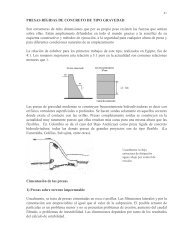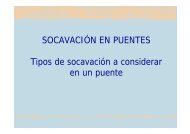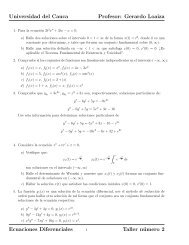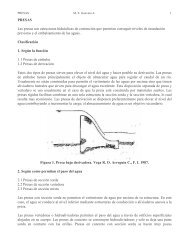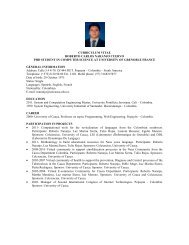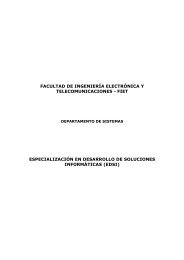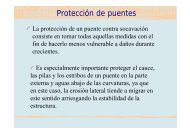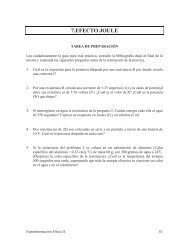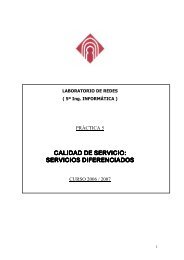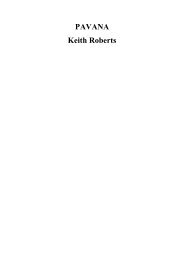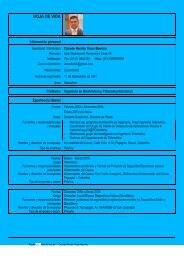Advice for the Project Management Professional (PMP)
Advice for the Project Management Professional (PMP)
Advice for the Project Management Professional (PMP)
Create successful ePaper yourself
Turn your PDF publications into a flip-book with our unique Google optimized e-Paper software.
Licensed to:<br />
406<br />
Appendix B<br />
institution, date, and number of hours <strong>for</strong> each course. For example, if you took<br />
a “principles of management” course at a university 20 years ago, you could<br />
list that on <strong>the</strong> education <strong>for</strong>m along with a one- or two-day <strong>PMP</strong> exam preparation<br />
class.<br />
3. Agree to <strong>the</strong> <strong>PMP</strong> certificant and candidate agreement and release statement.<br />
This <strong>for</strong>m certifies that application in<strong>for</strong>mation is accurate and complete and<br />
that candidates will conduct <strong>the</strong>mselves in accordance with <strong>the</strong> Code of Ethics<br />
and <strong>Professional</strong> Conduct, professional development requirements, and<br />
o<strong>the</strong>r PMI certification program policies and procedures. You can simply<br />
check a box saying you agree to this in<strong>for</strong>mation when applying online. Note<br />
that PMI randomly audits 10–15 percent of applications, so be prepared to<br />
provide more detailed in<strong>for</strong>mation as requested if audited, such as college transcripts,<br />
signatures of supervisors or managers to verify experience, etc.<br />
4. Pay <strong>the</strong> appropriate exam fee. As of January 2007, <strong>the</strong> <strong>PMP</strong> certification fee<br />
was $405 <strong>for</strong> PMI members and $555 <strong>for</strong> non-members. The re-examination<br />
fee (if you don’t pass <strong>the</strong> exam) is $275 <strong>for</strong> PMI members and $375 <strong>for</strong> nonmembers.<br />
The annual individual PMI membership fee is $129 (including <strong>the</strong><br />
$10 application fee). Note that students, or anyone enrolled in a degreegranting<br />
program at an accredited, or globally equivalent, college or university,<br />
can join PMI at <strong>the</strong> student member rate of only $40 (including <strong>the</strong> $10<br />
application fee). If you want to earn your <strong>PMP</strong> certification, it makes sense to<br />
join PMI, not only <strong>for</strong> <strong>the</strong> financial savings, but also <strong>for</strong> o<strong>the</strong>r benefits. Consult<br />
PMI’s Web site <strong>for</strong> membership in<strong>for</strong>mation.<br />
The last step in earning <strong>PMP</strong> certification is passing <strong>the</strong> exam! After PMI sends you an<br />
eligibility letter to take <strong>the</strong> <strong>PMP</strong> exam, you can sign up to take it at several different testing<br />
sites. You must take <strong>the</strong> exam within one year of receiving your eligibility letter. The eligibility<br />
letter will include complete details <strong>for</strong> scheduling your exam. As of January 2007,<br />
<strong>the</strong> <strong>PMP</strong> exam consisted of 200 four-option multiple-choice questions, and 25 of those<br />
questions are considered pretest questions that do not affect your score. The pretest questions<br />
are randomly placed throughout <strong>the</strong> exam and are used to test <strong>the</strong> validity of future<br />
examination questions. Although you cannot use any study aids during <strong>the</strong> exam, you<br />
can bring a nonprogrammable calculator to assist in per<strong>for</strong>ming calculations required to<br />
answer some of <strong>the</strong> questions. You are also given two blank pieces of paper, so you can write<br />
down <strong>for</strong>mulas or o<strong>the</strong>r in<strong>for</strong>mation when you enter <strong>the</strong> exam room, but you cannot bring<br />
in any notes or o<strong>the</strong>r materials. The questions on each test are randomly selected from<br />
a large test bank, so each person taking <strong>the</strong> exam receives different questions. The exam<br />
is preceded by a 15-minute computer tutorial to familiarize you with <strong>the</strong> mechanics of taking<br />
<strong>the</strong> exam. Test takers have four hours to take this computerized exam, and a passing<br />
score is 60.5 percent, or at least 106 correct answers out of <strong>the</strong> 175 scored questions, as of<br />
January 2007. PMI reviews and revises <strong>the</strong> exam annually. Be sure you consult PMI’s Web<br />
site <strong>for</strong> any notices about changes to <strong>the</strong> <strong>PMP</strong> exam. For example, <strong>the</strong> passing percentage<br />
was changed several times to achieve PMI’s goal of having around 75 percent of people<br />
pass <strong>the</strong> exam. PMI uses <strong>the</strong> Modified Angoff Technique, a certification industry practice<br />
standard, to determine <strong>the</strong> passing score.<br />
PMI offers a professional development program <strong>for</strong> maintaining <strong>the</strong> <strong>PMP</strong> certification.<br />
To maintain your <strong>PMP</strong> status, you must earn at least 60 <strong>Professional</strong> Development Units<br />
Copyright 2009 Cengage Learning. All Rights Reserved.<br />
May not be copied, scanned, or duplicated, in whole or in part.



